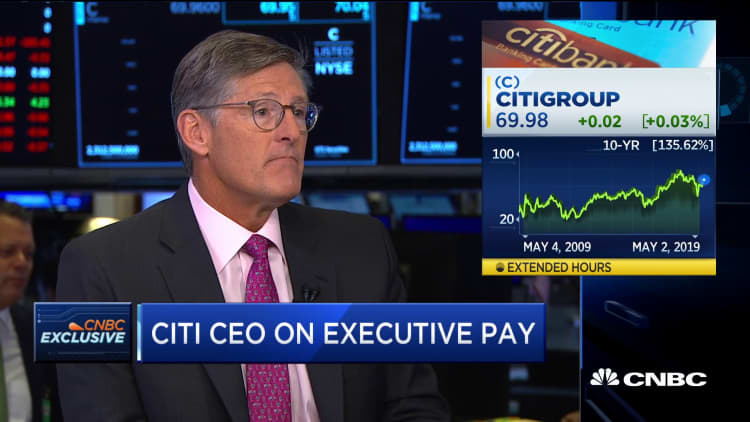Top corporate executives have seen their pay grow by more than 1,000% over the past 40 years, nearly 100 times the rate of average workers, according to a study released this week.
With wealth disparity continuing to accelerate, particularly since the financial crisis, the Economic Policy Institute reports that the gap between CEOs at the top 350 U.S. firms and the rank and file remains wide.
In terms of pay, benefits and the value of stock options when they are exercised, total CEO compensation growth was 1,007.5% from 1978 to 2018. That compares with a wage increase of just 11.9% for what the liberal-leaning institute terms "average workers." Using another measure of compensation, which takes into account the realized value of the options when they were granted, the CEO comp growth still stood at 940.3%.

Institute researchers Lawrence Mishel and Julia Wolfe called for action to reduce the pay gap, even if means taxing the firms where the disparity is greatest.
"Exorbitant CEO pay is a major contributor to rising inequality that we could safely do away with," they wrote. "The economy would suffer no harm if CEOs were paid less (or taxed more)."
Disparity between executives and the broader workforce has been a hot-button issue as the gap has widened over the decades.
In comparative terms, CEOs now make on average 278 times the average worker's salary, using the options-exercised formula. That's up from 58 times in 1989 and 20 times in 1965, according to the institute's figures though, it is down from the 2000 peak of 368 to 1. The total compensation growth since 1978 has outstripped that of the stock market growth of 706.7% and the wages of "very high earners," which have grown 339.2%.
Mishel and Wolfe propose a variety of policy remedies: higher tax rates for top earners, taxing companies more that have greater compensation disparities, a "luxury tax" that would impose a $1 levy for every dollar companies go over a certain ratio cap, and corporate governance reforms that would give shareholders a greater say over wages.
"We need to enact policy solutions that would both reduce incentives for CEOs to extract economic concessions and limit their ability to do so," the EPI team wrote.
Some of the top-paid CEOs include David Zaslav at Discovery ($129.5 million), Lawrence Ellison at Oracle ($108.9 million), John Legere at T-Mobile ($66.5 million), Robert Iger at Disney ($65.6 million) and Lachlan Murdoch at News Corp ($50.7 million), according to S&P Capital IQ records.
Measures to control their pay, though, would face opposition on the grounds that they are arbitrary and don't take into account the value that strong CEOs add to their companies compared with other workers.
"Nobody gets upset that Steph Curry or Beyonce makes a certain amount of money, but the person who is an usher at the stadium makes a fraction of what they made," said Carol Roth, CEO of Intercap Merchant Partners, a business advisory firm. "So I don't understand why there is any comparison between what a CEO makes and a quote unquote average worker makes."
Roth also said the numbers are skewed by a few CEOs who earn huge compensation packages, and added that taking pay from CEOs and redistributing it to thousands of workers wouldn't make a difference to the workers anyway.
"The CEO is not getting paid at the expense of workers," Roth said. "The workers are making what they make because that's the market rate. If the CEO didn't get paid that much, it's not that the workers would get paid more. That money would go somewhere else."


